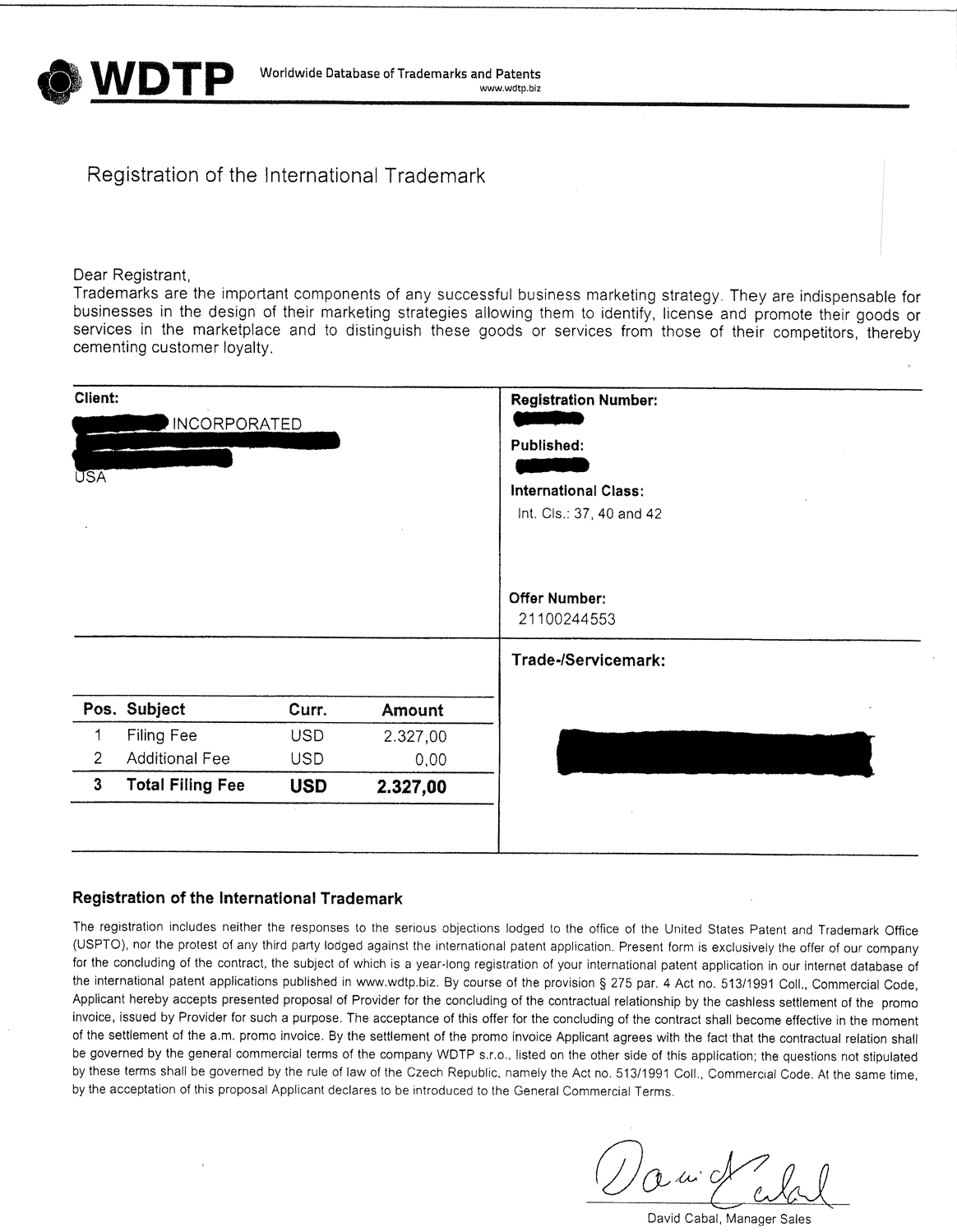Entries by Michael Atkins (1064)
STL Launches Western District Trademark Orders Database
This marks the launch of STL’s Western District Trademark Orders page.
What I envision is a clearinghouse of all substantive orders issued in trademark cases by the U.S. District Court for the Western District of Washington.
Assigned to Judge X and want to know how he or she has decided motions? Analyzed likelihood of confusion? Whether he or she has granted or denied motions to dismiss? Look no further.
So far, I’ve collected all substantive orders in cases filed in 2010 that were flagged as trademark cases in PACER. I hope to turn this into a one-stop shop for trademark order intel in the Western District.
If you have any ideas how I can make this database more useful, let me know. I aim to please!
The database is now complete and current through June 21 for all trademark cases filed between January 1, 2008, and May 31, 2011. It contains approximately 137 orders.
Trademark Owners: Don't Be Fooled by Unsolicited "Invoices" for Registration
 The Worldwide Database of Trademarks and Patents’
The Worldwide Database of Trademarks and Patents’
recent “invoice” to a federal trademark registrant
I’ve discussed this before, but it’s worth discussing again.
An unsuspecting trademark owner obtains a federal trademark registration. Guess what happens next? He/she/it starts receiving “invoices” from official-looking third parties requesting payment in connection with their registration.
My client recently received two: one from the “Register of International Patents and Trademarks” and another from the “Worldwide Database of Trademarks and Patents.”
The Register of International Patents and Trademarks, with the formal name of “RIPT s.r.o” of Bratislava, Slovak Republic, issued a “charge of registration” fee of $2,662.50 and urged he registrant to “pay the amount above, on acceptance, within 10 days by wire transfer or cheque!”
The Worldwide Database of Trademarks and Patents, with the formal name of “WDTP s.r.o,” also of Bratislava, is a relative bargain. Its invoice is for “only” $2,327.
So what does one get for these services? Nothing of value, but it’s buried in the fine print.
The Register states: “The publishing of the public registration of your patent is the basis of our offer. We offer the registration of your Patent dates in our private Database.”
The Worldwide Database states: “Present form is exclusively the offer of our company for the concluding of the contract, the subject of which is a year-long registration of your international patent application in our internet database of the international patent applications published in www.wdtp.biz.”
Never mind that these notices are sent to trademark registrants, not patent holders.
The punch line? You get your registration published in a private database.
Heck, I’d put a registration in my own private database for half of what they’re charging.
Kidding aside, don’t waste your money. And don’t be fooled by unsolicited invoices. Heed the warnings of WIPO and Europe’s trademark office, which have started collecting such invoices — if not my own.
Brooks Sues Adidas over PUREPROJECT Shoe Trademark
 Ads for declaratory judgment plaintiff Brooks’ PUREPROJECT (top)
Ads for declaratory judgment plaintiff Brooks’ PUREPROJECT (top)
and defendant Adidas’ ADIPURE athletic shoes
It’s PUREPROJECT vs. ADIPURE.
Brooks Sports, Inc. vs. Adidas AG.
On June 3, Brooks filed suit seeking a declaratory judgment that its new PUREPROJECT shoe brand does not infringe Adidas’ ADIPURE shoe brand.
The Western District complaint alleges that athletic shoe designers have used “Pure” as part of a trademark for years and such use remains common today.
Brooks also claims that consumers associate the “Adi” formative and three-stripe design with Adidas, not the formative “Pure.”
“Defendants simply do not have any valid trademark rights in the term “pure” alone,” the complaint states.
Brooks alleges it filed suit in response to Adidas’ letters threatening to file suit itself.
Adidas has not yet answered Brooks’ complaint.
The case cite is Brooks Sports, Inc. v. Adidas AG, No. 11-0937 (W.D Wash.)
Seattle Bartenders Join Boycott of Perceived Trademark Bully
 Screen shot from alleged trademark bully Pusser’s Web site
Screen shot from alleged trademark bully Pusser’s Web site
Some Seattle bartenders have banded with their New York bretheran in an effort to stop what they view as trademark bullying.
Seattle Met magazine’s Sauced Blog recently wrote that British Virgin Island rum maker Pusser’s Ltd. Corp. threatened legal action action against two New York bartenders who opened a tiki bar called “Painkiller” and mixed a drink they called the “Painkiller.”
Pusser’s owns two federal registrations with the PAINKILLER formative: PAINKILLER for “alcoholic fruit drinks with fruit juices and cream of coconut and coconut juice” and PAINKILLER COCKTAIL MIX for “non-alcoholic mixed fruit juices.” It also owns a couple pending PAINKILLER applications for “restaurant and bar services.”
The Painkiller bar’s drink contained rum, but not Pusser’s rum.
Sauced reported that a number of Seattle bartenders have joined a Facebook group calling for a boycott on Pusser’s.
Seattle bartender Jim Romdall signed on. “None of us feel like you should be able to copyright the recipe of a cocktail or the name of a cocktail,” he told Sauced. “That’s like Ragu trying to copyright ‘Bolognese.’”
A few thoughts. First, put into trademark terms, the bartenders spoiling for a boycott appear to argue that “Painkiller” is a generic term for a type of drink. I’m not into fancy drinks, so I don’t know if that’s true. But a number of bartenders — who would seem to be in a good position to know — have signed onto the boycott.
Second, this isn’t the first time STL has seen a trademark dispute come out of the name of a mixed drink. Longtime readers may have a distant memory that Gosling’s took a similar stance with respect to the “Dark ‘n Stormy” drink. They claimed the drink is made exclusively with Gosling’s Black Seal rum, a splash of ginger beer, and nothing else. In their view, if it’s not made with Gosling’s, it’s not a “Dark ‘n Stormy.” The New York Times covered that dispute. At the time, I stated that cocktail trademark disputes are rare. But now it looks like it’s not as rare as I thought.
Third, the Facebook boycott call illustrates what can happen if you’re perceived as a trademark bully. Throw your weight around with the little guy too much and you can be on the receiving end of an Internet campaign against you. That’s something that Professor McCarthy warned of when he spoke at Microsoft in February.
So for those in the know, is “Painkiller” a type of drink? Or is it a specific drink that’s made with Pusser’s rum?
For what it’s worth, Wikipedia declares that “Painkiller” to be a rum cocktail “traditionally made by frothing a mixture of dark rum, orange juice, pineapple juice, sweetened coconut cream, and shaved ice, and a topping with nutmeg.” It doesn’t mention Pusser’s. Again, for what it’s worth.
Great additional discussion at Cocktailians, my new favorite blog.
Western District Grants, Denies Motion to Dismiss Plaintiff's Amended Complaint
Plaintiff Basel Action Network and defendant International Association of Electronics Recyclers (IAER) both provide certified electronics recycling programs.
But IAER has something Basel doesn’t have: a federal registration for CERTIFIED ELECTRONICS RECYCLER as a certification mark.
Basel thinks that mark is generic and should be available for anyone to use. Based on that belief, it sued to have IAER’s registration cancelled (complaint here; STL post here).
In December 2010, the Western District dismissed Basel’s claims (STL post here). Basel then filed an amended complaint, alleging that IAER engaged in unfair competition by confusing consumers as to origin and by falsely advertising its status, again seeking to have the registration cancelled.
IAER again moved to dismiss.
On June 7, the court granted IAER’s motion with respect to Basel’s confusion-of-origin theory but denied it with respect to its false advertising theory.
Basel alleged that consumers who attended a September 2010 conference at which both Basel and one of the defendants presented were confused between the two. The court rejected that contention.
“The court finds that Basel has not stated a confusion-of-origin claim based on anything more than Defendants’ use of the generic term ‘certified electronics recycler.’ In Basel’s example based on the September 2010 conference agenda, there is no suggestion that anything other than the term ‘certified electronics recycler’ caused attendees to confuse [defendant Institute of Scrap Recycling Industries’] presentation for Basel’s. Indeed, the agenda identified ISRI as the presenter for the morning session, and Basel as the presenter for the afternoon session. If attendees were confused, there is no plausible allegation that they were confused by something other than ISRI’s use of the generic term ‘certified electronics recycler.’”
The court allowed Basel to proceed on its false advertising claim that defendants have said they alone can provide “the trademarked designation of ‘CERTIFIED ELECTRONICS RECYCLER®.’”
The court wrote that “[i]f ‘certified electronics recycler’ is a generic term, then Defendants’ claim that only they provide the ‘trademarked designation of ‘CERTIFIED ELECTRONICS RECYCLER®’ is true, but incomplete.”
The court went on to find that defendants are obligated “not to abbreviate the truth in a way that misleads consumers. It is not plausible that Defendants chose to tout the registration of their certification to advertise that they hold a meaningless registration for a generic term. The question thus arises: why are Defendants advertising their registration? It is plausible that Defendants intend to convey that they hold a PTO registration is significant in a way that matters to consumers. It is plausible, for example, that Defendants hope that the public will perceive their PTO registration as a favorable substantive judgment on their certification program. It is plausible that Defendants hope that the public will perceive that their use of the term ‘certified electronics recycler’ is somehow ‘official’ or government-sanctioned. ….
“If Defendants convey any of the messages listed above, they misrepresent the import of their PTO registration, and thus engage in false advertising in violation of the Lanham Act. Cancelling Defendants’ registration would remedy the harm about which Basel complains. With their registration cancelled, Defendants would no longer be able to tout their registration in advertisements. Accordingly, the court concludes not only that Basel has stated a Lanham Act false advertising claim, but that this claim is a valid independent cause of action for which cancellation is a remedy, in accordance with the court’s prior order.”
The case cite is Basel Action Network v. International Association of Electronics Recyclers, No. 10-0931 (W.D Wash. June 6, 2011) (Jones, J.).